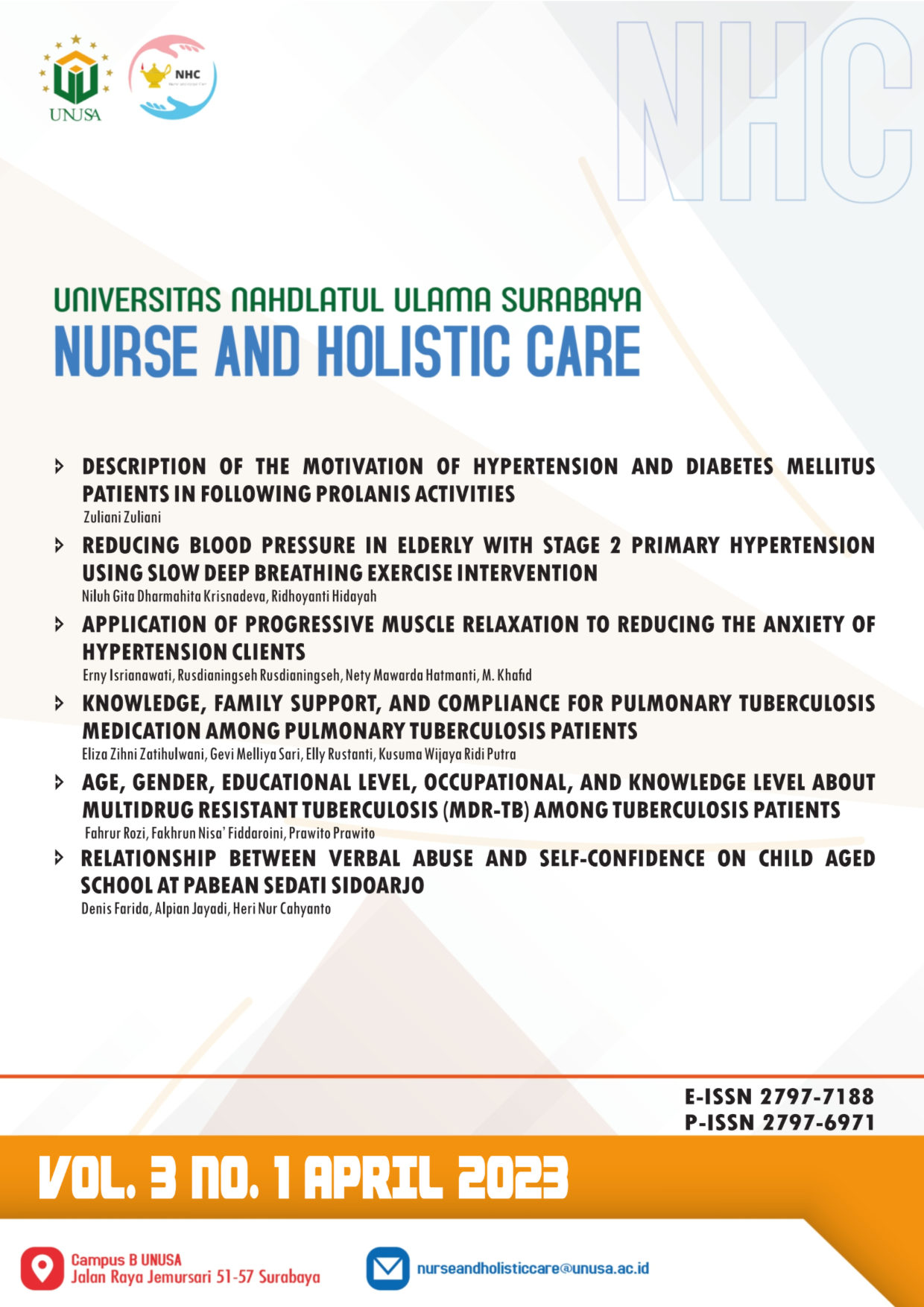RELATIONSHIP BETWEEN VERBAL ABUSE AND SELF-CONFIDENCE ON CHILD AGED SCHOOL AT PABEAN SEDATI SIDOARJO
##plugins.themes.bootstrap3.article.main##
Abstract
Background: Verbal abuse is a type of verbal abuse that can cause stress and have a negative impact on mental health. Verbal abuse if done continuously to children in the long term will have an impact on self-confidence in children.
Objective: The purpose of this study was to determine the relationship between verbal abuse and self-confidence in children in Pabean Village, Sedati District, Sidoarjo.
Methods: The method in this research is to use a quantitative type of research with a cross sectional research design. The sample in this study amounted to 36 people. The sampling technique used purposive sampling technique. Data collection using questionnaires and data analysis using the Spearman Rank (Rho) test.
Result: The results of the Spearman Rank statistical test obtained (p = 0.000; r = -0.570). The relationship between verbal abuse and self-confidence of school-age children, at Pabean Sidoaarjo has a strong relationship with a negative correlation.
Conclusion: The importance of preventing and overcoming verbal abuse in children. This research provides an understanding of the negative impact of verbal abuse on children's self-esteem and reinforces the need to develop approaches that involve protection and recovery for children who have experienced verbal abuse. Measures of protection, education and psychological support should be put in place to ensure the mental and emotional well-being of children in society.
Downloads
##plugins.themes.bootstrap3.article.details##
Copyright (c) 2023 Denis Farida, Alpian Jayadi, Heri Nur Cahyanto

This work is licensed under a Creative Commons Attribution-NonCommercial 4.0 International License.
Authors who publish with Nurse and Holistic Care agree to the following terms:
- Authors retain copyright licensed under a Creative Commons Attribution-NonCommercial 4.0 (CC BY-NC 4.0), which allows others to remix, tweak, and build upon the authors' work non-commercially, and although the others' new works must also acknowledge the authors and be non-commercial, they don't have to license their derivative works on the same terms.
- Authors are permitted and encouraged to post their work online (e.g., in institutional repositories or on their website) prior to and during the submission process, as it can lead to productive exchanges, as well as earlier and greater citation of published work (See The Effect of Open Access). Authors can archive pre-print and post-print or publisher's version/PDF.
References
Aini, D. F. N. (2018). Self esteem pada anak usia sekolah dasar untuk pencegahan kasus bullying. Jurnal Pemikiran Dan Pengembangan Sekolah Dasar (Jp2sd), 6(1), 36–46. DOI: https://doi.org/10.22219/jp2sd.v6i1.5901
Dewi, M. P., Neviyarni, S., & Irdamurni, I. (2020). Perkembangan bahasa, emosi, dan sosial anak usia sekolah dasar. Jurnal Ilmiah Pendidikan Dasar, 7(1), 1–11. DOI: https://doi.org/10.30659/pendas.7.1.1-11
Marsari, H., Neviyarni, N., & Irdamurni, I. (2021). Perkembangan emosi anak usia sekolah dasar. Jurnal Pendidikan Tambusai, 5(1), 1816–1822.
Noach, Y. M. C., & Sette, G. Y. (2022). Pengaruh verbal abuse terhadap kepercayaan diri remaja usia 12-15 tahun pada ppo io 0496 gmit jemaat maranatha oebufu klasis kupang tengah. Jurnal Sosial Humaniora Sigli, 5(2), 290–294. DOI: https://doi.org/10.47647/jsh.v5i2.972
Pardede, J. A. (2020). Kesiapan peningkatan perkembangan anak usia sekolah. OSFpreprints. DOI: https://doi.org/10.31219/osf.io/p6vae
Vanaja, Y., & Geetha, D. (2017). A Study on Locus of Control and Self Confidence of High School Students. International Journal of Research-Granthaalayah, 5(7), 598–602. DOI: https://doi.org/10.29121/granthaalayah.v5.i7.2017.2167
Yulisetyaningrum, Y. (2019). Perkembangan Sosial Emosional Anak Usia Pra Sekolah. Jurnal Ilmu Keperawatan Dan Kebidanan, 10(1), 221–228. DOI: https://doi.org/10.26751/jikk.v10i1.645

